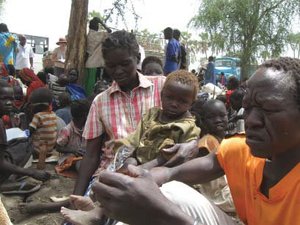With hunger emergencies ongoing in the Sahel region of Africa, Sudan, Yemen, Afghanistan and other countries, President Barack Obama faces one of his most daunting foreign policy challenges. The President will be making a speech about the global hunger crisis this Friday, May 18th, at the Symposium on Global Agriculture and Food Security in Washington D.C.
Obama’s speech will be pivotal in rallying support to fight off famine on multiple fronts. In the Sahel region of Africa massive drought and a conflict in Northern Mali have placed over 16 million people at risk of starvation. The Sahel hunger crisis, which impacts Niger, Mauritania, Mali, and at least five other nations, is expected to peak this summer. Aid agencies are short on funding to meet the challenge. Annie Bodmer-Roy, of Save the Children, posted on Twitter today about the tragedy aid workers are witnessing in Niger: “Hear[t]breaking news this aft: 7mnth-old boy I met yesterday, badly malnourished, did not make it through the day. We need to stop this.”
The UN World Food Programme’s director Ertharin Cousin and UNHCR director Antonio Guterres said in a joint statement, “The window of opportunity to save lives is narrowing by the day. Today we appeal to the international community on behalf of the most vulnerable people in Niger and Sahelian countries. The time to act is now.”
The Sahel though is not the only area in crisis. East Africa is still recovering from last year’s drought and famine.
In Sudan, as conflict escalates so does hunger. Farmers have been forced away from their land. Drought also has hit, leveling another blow at food production. As peace efforts go forward by the U.S. and allies, so too must humanitarian aid to the displaced. There must be a special effort at food for malnourished children under five years of age, and also feeding programs for school age children.
In Afghanistan, hunger and malnutrition have severely damaged hopes for peace and development within the country. Low funding for the UN World Food Programme (WFP) has limited its ability to carry out hunger relief missions. The UN agency is warning that funding shortages will mean more cuts to programs helping the hungry. Even school feeding programs of high energy biscuits and take-home rations will face cuts again as they did last year unless support comes from the international community.
Yemen, a country high on the U.S. national security priorities, is deeply mired in hunger and malnutrition. The World Food Programme says that 22 percent of the population suffers from severe hunger.
A report from the UN says, there are almost one million children under the age of five in Yemen who are estimated to suffer from acute malnutrition, with 267,000 children at risk of dying without food aid. Children who suffer from malnutrition in the first years of life suffer lasting physical and mental damage. The key is to intervene quickly.
About 60 percent of Yemen’s children suffer from stunting. Child malnutrition in parts of Yemen rivals that of famine-ravaged Somalia. The United Nations says that the humanitarian response plan in Yemen remains $265 million dollars underfunded.
The challenge facing President Obama, as was the case with some of his predecessors, is to rally support for fighting global hunger, an issue often off the radar of politicians and media.
President Harry Truman was able to do so after World War II when hunger threatened the recovery of the World War II devastated countries. Truman worked closely with former President Herbert Hoover to build support at home and abroad. Dwight Eisenhower was also among those speaking out of the need for fighting hunger in order to win the peace. When Eisenhower later became president he started the Food for Peace program which today needs a funding boost to meet the growing humanitarian challenge.
Food for Peace is the primary tool of the US when it comes to fighting global hunger. The program makes donations to countries suffering from hunger. For instance Food for Peace donations came to the aid of East Africa last year when a severe drought hit. The World Food Programme, Catholic Relief Services and other organizations distribute the food.
The Food for Peace program though is only as strong as how much funding Congress allows when it makes the foreign policy budget. The funding range right now for Food for Peace is around $1.5 billion dollars a year, whereas the annual cost to the nuclear weapons program is at least $52 billion dollars a year.
Today, there clearly is a need to boost the funding for Food for Peace and other aid programs given the size of the humanitarian disaster facing the globe. Increased emphasis to Food for Peace may be starting to take hold. So far this year U.S. Food for Peace donations to Yemen have increased over 2011. The most recent US Food for Peace donations totaling $47 million dollars will help feed Yemenis displaced by the ongoing conflict.
President Obama’s focus needs to be on the ongoing humanitarian emergencies and also how to prevent them from recurring. This means peace efforts to end the conflicts causing so much hunger and displacement, and food aid to reinforce the peace. The key is to build up food production in impoverished countries. Increasing the resilience of the small farmer to drought, will be a key topic of discussion at the symposium along with how the governments and business leaders can work together to make this happen.
Article first published as President Obama to Make Speech About Global Hunger Crisis on Blogcritics.


